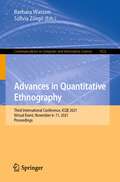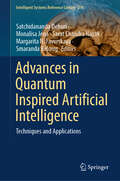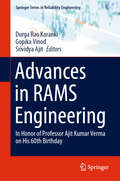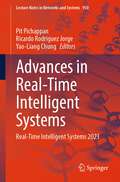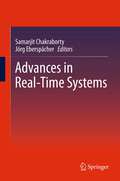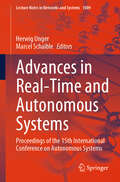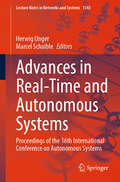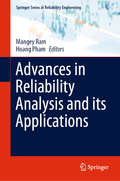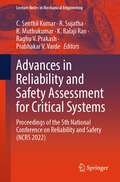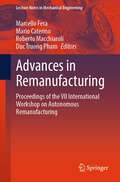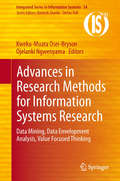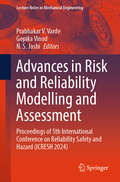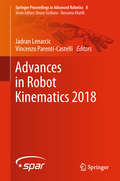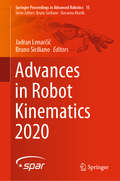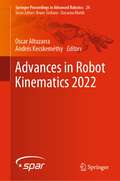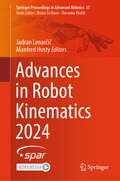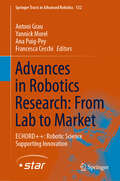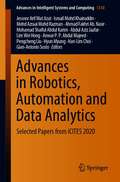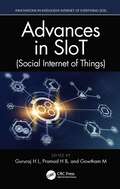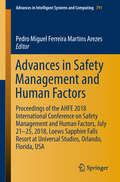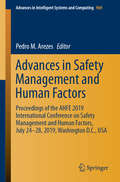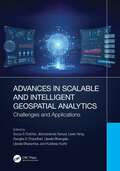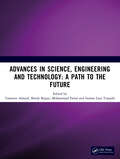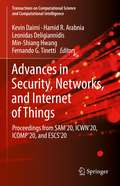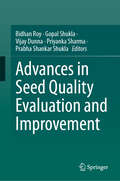- Table View
- List View
Advances in Quantitative Ethnography: Third International Conference, ICQE 2021, Virtual Event, November 6–11, 2021, Proceedings (Communications in Computer and Information Science #1522)
by Barbara Wasson Szilvia ZörgőThis book constitutes the refereed proceedings of the Third International Conference on Quantitative Ethnography, ICQE 2021, held in November 2021. Due to the COVID-19 pandemic the conference was held online. The 26 full papers were selected from the 60 submissions. The contributions in this volume come from diverse fields and perspectives, and present the studies on advantages of using quantitative ethnography methods and techniques in a number of different domains and contexts, including ethnography and statistics, human interpretation and machine processing, etc.
Advances in Quantum Inspired Artificial Intelligence: Techniques and Applications (Intelligent Systems Reference Library #274)
by Satchidananda Dehuri Margarita N. Favorskaya Smaranda Belciug Monalisa Jena Sarat Chandra NayakThis book advances the artificial intelligence techniques by strongly inspired from quantum computing. Quantum computing (QC), rooted in the mysterious principles of quantum mechanics, has fascinated scientists, researchers, and visionaries for a long time. Its potential lies in changing how we compute, moving from classical bits to quantum bits (qubits), and unlocking incredible processing capabilities. At the same time, artificial intelligence (AI) has been on a trajectory of rapid advancement, with deep learning becoming proficient at tasks that were once deemed impossible. At this juncture, integrating these two fields through various means can play a pivotal role to bring a technological revolution.
Advances in RAMS Engineering: In Honor of Professor Ajit Kumar Verma on His 60th Birthday (Springer Series in Reliability Engineering)
by Srividya Ajit Durga Rao Karanki Gopika VinodThis book surveys reliability, availability, maintainability and safety (RAMS) analyses of various engineering systems. It highlights their role throughout the lifecycle of engineering systems and explains how RAMS activities contribute to their efficient and economic design and operation. The book discusses a variety of examples and applications of RAMS analysis, including: • software products; • electrical and electronic engineering systems; • mechanical engineering systems; • nuclear power plants; • chemical and process plants and • railway systems. The wide-ranging nature of the applications discussed highlights the multidisciplinary nature of complex engineering systems. The book provides a quick reference to the latest advances and terminology in various engineering fields, assisting students and researchers in the areas of reliability, availability, maintainability, and safety engineering.
Advances in Real-Time Intelligent Systems: Real-Time Intelligent Systems 2023 (Lecture Notes in Networks and Systems #950)
by Pit Pichappan Ricardo Rodriguez Jorge Yao-Liang ChungThe current information society is transitioning to an intelligent society where real-world and real-data applications have a profound influence. Real-time computing has an enormous impact on the future information society. Unimaginable applications have been emerging in real-time applications in the last two years. Logical reasoning and inference-making activities by machines have become a reality. Complex and heterogeneous data are being processed and infused into machine intelligence, bringing machine intelligence equal to human intelligence. Real-time data and real-time intelligence are the crux of the current research. This book of 41 papers in real-time intelligent systems addresses various issues ranging from real-time algorithms to various applications in real-time intelligence. The contributions of this book will mark a significant impact in the near-future research in real-time intelligence.
Advances in Real-Time Systems
by Jörg Eberspächer Samarjit ChakrabortyThis volume contains the lectures given in honor to Georg Färber as tribute to his contributions in the area of real-time and embedded systems. The chapters of many leading scientists cover a wide range of aspects, like robot or automotive vision systems or medical aspects.
Advances in Real-Time and Autonomous Systems: Proceedings of the 15th International Conference on Autonomous Systems (Lecture Notes in Networks and Systems #1009)
by Herwig Unger Marcel SchaibleThe 15th International conference on "Autonomous Systems" is addressing an important topic for computing systems and communication networks due to increasingly complex environments they are working in. Therefore, this conferences addresses methods and solutions enabling such systems to independently adapt themselves to changed environmental conditions, are able to learn from different sources and to process external requests dependably, safely and timely. The solutions presented here range from hardware to system design to individual applications. The book contains the results of the researchers presented at this conference, which is supported by GI (German Society of informatics) and other organisations Real-Time Systems Expert Committees. The target audience is students and researchers in computer science and automation technology, engineers, programmers and users of automation and communication systems.
Advances in Real-Time and Autonomous Systems: Proceedings of the 16th International Conference on Autonomous Systems (Lecture Notes in Networks and Systems #1543)
by Herwig Unger Marcel SchaibleThis book serves as both a cutting-edge reference and a practical guide to building AI systems that are transparent, trustworthy, and tuned for real-world impact, featuring contributors from three continents and backed by leading institutions. Unlock the next wave of graph-based artificial intelligence, fuzzy logic, and human-centric machine learning with this authoritative Springer proceedings book. Twenty-four rigorously peer-reviewed chapters—spanning semantic similarity in Wikipedia, sparse distributed representations, explainable image generation, privacy-preserving mobility analytics, sentiment mining in public transport, counterfeit-banknote detection, 5G network capacity planning, and mixed-order traffic prediction—provide a panoramic view of state-of-the-art research that turns theory into deployable solutions. Readers gain step-by-step methodologies for building restricted Boltzmann machines enhanced with fuzziness, dual-graph semantic extractors, Bloom-filter variants, and the versatile GraphLearner simulator. Each contribution includes reproducible workflows, comparative baselines, and publicly available code or datasets—accelerating adoption in academia and industry alike. Highlights include a blueprint for emotion-aware AI agents, a cloud-intelligence framework that empowers SMEs with decision support, and an adaptive metric for privacy-preserving urban-mobility sharing that balances usability and anonymity.
Advances in Reliability Analysis and its Applications (Springer Series in Reliability Engineering)
by Hoang Pham Mangey RamThis book presents the latest research in the fields of reliability theory and its applications, providing a comprehensive overview of reliability engineering and discussing various tools, techniques, strategies and methods within these areas. Reliability analysis is one of the most multidimensional topics in the field of systems reliability engineering, and while its rapid development creates opportunities for industrialists and academics, it is also means that it is hard to keep up to date with the research taking place. By gathering findings from institutions around the globe, the book offers insights into the international developments in the field. As well as discussing the current areas of research, it also identifies knowledge gaps in reliability theory and its applications and highlights fruitful avenues for future research. Covering topics from life cycle sustainability to performance analysis of cloud computing, this book is ideal for upper undergraduate and postgraduate researchers studying reliability engineering.
Advances in Reliability and Safety Assessment for Critical Systems: Proceedings of the 5th National Conference on Reliability and Safety (NCRS 2022) (Lecture Notes in Mechanical Engineering)
by R. Muthukumar R. Sujatha Raghu V. Prakash Prabhakar V. Varde C. Senthil Kumar K. Balaji RaoThis book comprises select proceedings of the 5th National Conference on Reliability and Safety (NCRS 2022). It provides comprehensive state-of-the-art research and development in diverse areas like reliability prediction, precursor event analysis, fuzzy reliability, structural reliability, passive system reliability, digital system reliability, risk informed approach to decision making, dynamic PSA, uncertainty and sensitivity modeling, among others. The book is a valuable resource for researchers and professionals working in both academia and industry in the areas of complex systems, safety critical systems and risk-based engineering.
Advances in Remanufacturing: Proceedings of the VII International Workshop on Autonomous Remanufacturing (Lecture Notes in Mechanical Engineering)
by Duc Truong Pham Marcello Fera Mario Caterino Roberto MacchiaroliThis book features the papers presented at IWAR 2023. The overall objective of the event was to bring together international scientists and engineers to bridge the academic and industrial worlds in the field of remanufacturing. Various themes related to remanufacturing, including methods for operations management, methodologies for quality assessment and life cycle assessment, the integration of robots in remanufacturing, and the use of modern I4.0 technologies in a remanufacturing context among others were addressed. This book is intended for academics, graduate students, researchers, as well as industrial practitioners engaged in the field of remanufacturing.
Advances in Research Methods for Information Systems Research: Data Mining, Data Envelopment Analysis, Value Focused Thinking (Integrated Series in Information Systems #34)
by Kweku-Muata Osei-Bryson Ojelanki NgwenyamaAdvances in social science research methodologies and data analytic methods are changing the way research in information systems is conducted. New developments in statistical software technologies for data mining (DM) such as regression splines or decision tree induction can be used to assist researchers in systematic post-positivist theory testing and development. Established management science techniques like data envelopment analysis (DEA), and value focused thinking (VFT) can be used in combination with traditional statistical analysis and data mining techniques to more effectively explore behavioral questions in information systems research. As adoption and use of these research methods expand, there is growing need for a resource book to assist doctoral students and advanced researchers in understanding their potential to contribute to a broad range of research problems. Advances in Research Methods for Information Systems Research: Data Mining, Data Envelopment Analysis, Value Focused Thinking focuses on bridging and unifying these three different methodologies in order to bring them together in a unified volume for the information systems community. This book serves as a resource that provides overviews on each method, as well as applications on how they can be employed to address IS research problems. Its goal is to help researchers in their continuous efforts to set the pace for having an appropriate interplay between behavioral research and design science.
Advances in Risk and Reliability Modelling and Assessment: Proceedings of 5th International Conference on Reliability Safety and Hazard (ICRESH 2024) (Lecture Notes in Mechanical Engineering)
by Prabhakar V. Varde Gopika Vinod N. S. JoshiThis book presents the proceedings of the 5th International Conference on Reliability Safety & Hazard-2024, held in Mumbai during February 21–24, 2024. It covers the latest advances in artificial intelligence and machine learning in development of risk-conscious culture. Various topics covered in this volume are reliability prediction, precursor event analysis, fuzzy reliability, structural reliability, passive system reliability, digital system reliability, risk-informed approach to decision making, dynamic PSA, uncertainty and sensitivity modeling, among others. The book is a valuable resource for researchers and professionals working in both academia and industry in the areas of complex systems, safety-critical systems, and risk-based engineering.
Advances in Robot Kinematics 2018 (Springer Proceedings in Advanced Robotics #8)
by Jadran Lenarcic Vincenzo Parenti-CastelliThis is the proceedings of ARK 2018, the 16th International Symposium on Advances in Robot Kinematics, that was organized by the Group of Robotics, Automation and Biomechanics (GRAB) from the University of Bologna, Italy.ARK are international symposia of the highest level organized every two years since 1988. ARK provides a forum for researchers working in robot kinematics and stimulates new directions of research by forging links between robot kinematics and other areas.The main topics of the symposium of 2018 were: kinematic analysis of robots, robot modeling and simulation, kinematic design of robots, kinematics in robot control, theories and methods in kinematics, singularity analysis, kinematic problems in parallel robots, redundant robots, cable robots, over-constrained linkages, kinematics in biological systems, humanoid robots and humanoid subsystems.
Advances in Robot Kinematics 2020 (Springer Proceedings in Advanced Robotics #15)
by Jadran Lenarčič Bruno SicilianoThis book is of interest to researchers wanting to know more about the latest topics and methods in the fields of the kinematics, control and design of robotic systems. The papers cover the full range of robotic systems, including serial, parallel and cable-driven manipulators. The systems range from being less than fully mobile, to kinematically redundant, to over-constrained. The book brings together 43 peer-reviewed papers. They report on the latest scientific and applied achievements. The main theme that connects them is the movement of robots in the most diverse areas of application.
Advances in Robot Kinematics 2022 (Springer Proceedings in Advanced Robotics #24)
by Andrés Kecskeméthy Oscar AltuzarraThis book reports on the latest scientific achievements on robot kinematics provided by the prominent researchers participating in the 18th International Symposium on Advances in Robot Kinematics ARK2022, organized in the University of the Basque Country, Bilbao, Spain. It is of interest to researchers wanting to know more about the latest topics and methods in the fields of the kinematics, control and design of robotic systems. The book brings together 53 peer-reviewed papers. These cover the full range of robotic systems, including serial, parallel, flexible mechanisms, and cable-driven manipulators, and tackle problems such as: kinematic analysis of robots, robot modelling and simulation, theories and methods in kinematics, singularity analysis, kinematic problems in parallel robots, redundant robots, cable robots, kinematics in biological systems, flexible parallel manipulators, humanoid robots and humanoid subsystems.
Advances in Robot Kinematics 2024 (Springer Proceedings in Advanced Robotics #31)
by Manfred Husty Jadran LenarčičThis book is aimed at researchers specializing in the kinematics of robot mechanisms as well as at doctoral students in guiding their research work. A spectrum of the latest achievements in kinematics analysis, modelling, simulation, design and control is covered. New theories and methods are applied to serial, parallel and cable-driven mechanisms for use in industrial or service robotics. The systems range from being less than fully mobile to kinematically redundant and over-constrained. Forty-nine papers are included, arranged in seven chapters, as presented at the 19th Symposium on Advances in Robot Kinematics 2024. The symposium, which has been held since 1988, was organized this time in Ljubljana (Slovenia), where it began thirty-six years ago. The papers have been rigorously selected based on peer review and are arranged in chapters randomly, as is the prevailing tradition of these symposia. In doing so, we aim to give equal emphasis to each of these achievements.
Advances in Robotics Research: ECHORD++: Robotic Science Supporting Innovation (Springer Tracts in Advanced Robotics #132)
by Antoni Grau Yannick Morel Ana Puig-Pey Francesca CecchiIn this book Part I presents first an overview of the ECHORD++ project, with its mission and vision together with a detailed structure of its functionalities and instruments: Experiments, Robotic Innovation Facilities and Public end-user Driven Technology Innovation PDTI. Chapter 1 explains how the project is born, the partners, the different instruments and the new concept of cascade funding projects. This novelty made ECHORD++ a special project along the huge number of research groups and consortia involved in the whole project. So far, it is the European funded project with more research team and partners involved in the robotic field. In Chapter 2, one of the instruments in ECHORD++ is explained in detail: RIF. Robotic innovation facilities are a set of laboratories across Europe funded with the project with the goal of hosting consortia involved in any experiment that have special needs when testing their robotic research. In the chapter the three different and specific RIFs will be described and analyzed. Chapter 3 explains an important instrument in ECHORD++: the Experiments. In this part, a big number of research groups have been involve in short time funded research projects. The chapter explains the management of such Experiments, from the call for participation, the candidate’s selection, the monitoring, reviews and funding for each of the 36 experiments funded for Echord. Chapter 4 is very special because it presents the innovation of funding public end-user driven technology, in particular, robotic technology. The robotic challenge is the key of such an instruments together with the management of the different consortia that participated competitively in the success of the robotic challenge proposed by a public entity, selected also with a very special and innovative process.
Advances in Robotics, Automation and Data Analytics: Selected Papers from iCITES 2020 (Advances in Intelligent Systems and Computing #1350)
by Hyun Myung Han-Lim Choi Anwar P. P. Abdul Majeed Mohd Azraai Mohd Razman Gian-Antonio Susto Jessnor Arif Mat Jizat Mohamad Shaiful Abdul Karim Ismail Mohd Khairuddin Ahmad Fakhri Ab. Nasir Abdul Aziz Jaafar Lim Wei Hong Pengcheng LiuThis book presents essentially a collection of proceedings that deliberate on the key challenges and recent trends on robotics, automation and data analytics which are the pillars of Industry 4.0. Solutions that are employed in the multitude spectra of innovative robotics & automation and data analytics are discussed. The readers are expected to gain an insightful view on the current trends, issues, mitigating factors as well as solutions from the book. This book consists of selected papers presented at the 2nd International Conference on Innovative Technology, Engineering and Sciences 2020 (iCITES) hosted virtually by Universiti Malaysia Pahang on 22nd December 2020. iCITES is a biennial conference, aimed at building a platform that allows relevant stakeholders to share and discuss their latest researches, ideas and survey reports from theoretical to a practical standpoint especially in the Innovative Robotics & Automation and Data Analytics tracks which was published in this book.
Advances in SIoT (Innovations in Intelligent Internet of Everything (IoE))
by H L Gururaj H B Pramod M GowthamThe Social Internet of Things (SIoT) has become a hot topic in academic research. It employs the theory of social networks into the different levels of the Internet of Things (IoTs) and has brought new possibilities for the development of IoTs. Essentially, the SIoT is a subset of IoTs. It uses intelligent hardware and humans as the node, a social network as the organization type, the social relationship between things, things and humans, and between humans, formatting research methods and models with social network characteristics to realize the connection, service, and application of the IoTs. Moreover, SIoT is a form of realization of technology, architecture, and application of the IoTs using social network research methods. It further promotes the integration between real-world and virtual cyberspace, contributes the realization of the IoTs, expands the research scope of the social networking, and provides a new solution for the specific problems of the IoTs. Consequently, there is a tremendous need for researchers to have a comprehensive knowledge of the advances in SIoT. This special issue is soliciting scientific research papers that can present a snapshot of the latest research status of SIoT.
Advances in Safety Management and Human Factors: Proceedings of the AHFE 2018 International Conference on Safety Management and Human Factors, July 21-25, 2018, Loews Sapphire Falls Resort at Universal Studios, Orlando, Florida, USA (Advances in Intelligent Systems and Computing #791)
by Pedro Miguel ArezesThis book discusses the latest findings on ensuring employees’ safety, health, and welfare at work. It combines a range of disciplines – e.g. work physiology, health informatics, safety engineering, workplace design, injury prevention, and occupational psychology – and presents new strategies for safety management, including accident prevention methods such as performance testing and participatory ergonomics. The book, which is based on the AHFE 2018 International Conference on Safety Management and Human Factors, held on July 21–25, 2018, in Orlando, Florida, USA, provides readers, including decision makers, professional ergonomists and program managers in government and public authorities, with a timely snapshot of the state of the art in the field of safety, health, and welfare management. It also addresses agencies such as the Occupational Safety and Health Administration (OSHA) and the National Institute for Occupational Safety and Health (NIOSH), as well as other professionals dealing with occupational safety and health.
Advances in Safety Management and Human Factors: Proceedings of the AHFE 2019 International Conference on Safety Management and Human Factors, July 24-28, 2019, Washington D.C., USA (Advances in Intelligent Systems and Computing #969)
by Pedro M. ArezesThis book discusses the latest findings on ensuring employees’ safety, health, and welfare at work. It combines a range of disciplines – e.g. work physiology, health informatics, safety engineering, workplace design, injury prevention, and occupational psychology – and presents new strategies for safety management, including accident prevention methods such as performance testing and participatory ergonomics. The book, which is based on the AHFE 2019 International Conference on Safety Management and Human Factors, held on July 24-28, 2019, Washington D.C., USA, provides readers, including decision makers, professional ergonomists and program managers in government and public authorities, with a timely snapshot of the state of the art in the field of safety, health, and welfare management. It also addresses agencies such as the Occupational Safety and Health Administration (OSHA) and the National Institute for Occupational Safety and Health (NIOSH), as well as other professionals dealing with occupational safety and health.
Advances in Scalable and Intelligent Geospatial Analytics: Challenges and Applications
by Surya S Durbha Sangita S Chaudhari Jibonananda Sanyal Lexie Yang Ujwala Bhangale Ujwala Bharambe Kuldeep KurteGeospatial data acquisition and analysis techniques have experienced tremendous growth in the last few years, providing an opportunity to solve previously unsolved environmental- and natural resource-related problems. However, a variety of challenges are encountered in processing the highly voluminous geospatial data in a scalable and efficient manner. Technological advancements in high-performance computing, computer vision, and big data analytics are enabling the processing of big geospatial data in an efficient and timely manner. Many geospatial communities have already adopted these techniques in multidisciplinary geospatial applications around the world. This book is a single source that offers a comprehensive overview of the state of the art and future developments in this domain. FEATURES Demonstrates the recent advances in geospatial analytics tools, technologies, and algorithms Provides insight and direction to the geospatial community regarding the future trends in scalable and intelligent geospatial analytics Exhibits recent geospatial applications and demonstrates innovative ways to use big geospatial data to address various domain-specific, real-world problems Recognizes the analytical and computational challenges posed and opportunities provided by the increased volume, velocity, and veracity of geospatial data This book is beneficial to graduate and postgraduate students, academicians, research scholars, working professionals, industry experts, and government research agencies working in the geospatial domain, where GIS and remote sensing are used for a variety of purposes. Readers will gain insights into the emerging trends on scalable geospatial data analytics.
Advances in Science, Engineering and Technology
by Mohammad Faisal Suman Lata Tripathi Tasneem Ahmed Shrish BajpaiThe objective of the conference was to provide a common platform for innovative academicians and industrial experts working in the fields of sciences, engineering, and information technology. It provided a platform for knowledge exchange and the development of new ideas on the transformative technologies of quantum computing, video analytics, Artificial Intelligence, and Machine Learning. The conference also discussed the significance of cutting-edge technologies, specifically Machine Learning, and its pivotal role in the future of science and industry.
Advances in Security, Networks, and Internet of Things: Proceedings from SAM'20, ICWN'20, ICOMP'20, and ESCS'20 (Transactions on Computational Science and Computational Intelligence)
by Hamid R. Arabnia Kevin Daimi Leonidas Deligiannidis Min-Shiang Hwang Fernando G. TinettiThe book presents the proceedings of four conferences: The 19th International Conference on Security & Management (SAM'20), The 19th International Conference on Wireless Networks (ICWN'20), The 21st International Conference on Internet Computing & Internet of Things (ICOMP'20), and The 18th International Conference on Embedded Systems, Cyber-physical Systems (ESCS'20). The conferences took place in Las Vegas, NV, USA, July 27-30, 2020. The conferences are part of the larger 2020 World Congress in Computer Science, Computer Engineering, & Applied Computing (CSCE'20), which features 20 major tracks. Authors include academics, researchers, professionals, and students. Presents the proceedings of four conferences as part of the 2020 World Congress in Computer Science, Computer Engineering, & Applied Computing (CSCE'20);Includes the tracks on security & management, wireless networks, internet computing and IoT, and embedded systems as well as cyber-physical systems;Features papers from SAM’20, ICWN’20, ICOMP’20 and ESCS’20.
Advances in Seed Quality Evaluation and Improvement
by Gopal Shukla Priyanka Sharma Bidhan Roy Vijay Dunna Prabha Shankar ShuklaThis book discusses various aspects of Seed Science and Technology including seed production, seed certification, seed quality enhancements, seed testing and harvesting, and post-harvest management. Continued efforts are being made to preserve plant genetic resources over long term in order to conserve biodiversity and provide food security. Seed and germplasm repositories hold high importance in this regard. Various technologies such as cryopreservation is being commonly employed to preserve seeds and plant tissues at extremely low temperatures. This book discusses the advancements of data storage and information management systems that have aided in the creation of extensive seed databases, and thus enabling researchers to quickly catalogue and access data on seed kinds, properties and availability. This book also explains the sophisticated technologies such as nanobiotechnology, machine learning, artificial intelligence, magnetic resonance and multispectral imaging which are currently being used for examining seed quality, genetic analysis, seed preservation and seed handling operations. The scope of these technologies in increasing the effectiveness and precision of seed research, developing better crop varieties and promoting sustainable environmental preservation has also been covered. This book is a reference source for Scientists, researchers and authorities involved in the production and certification of seeds. It is also valuable for seed experts working in the public and commercial sectors globally.
